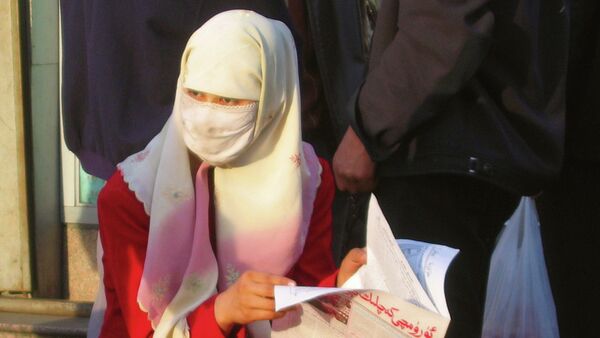MOSCOW, August 6 (RIA Novosti) – People wearing hijabs, niqabs, burqas or garments with the Islamic star and crescent symbol, as well as those with large beards have been barred from taking public buses in the Chinese city of Karamay, located in the Xinjiang province, AFP reports citing local Karamay Daily.
Police is expected to deal with those who fail to comply with the new regulations in the region with a large Muslim population. “Those who do not co-operate with inspection teams will be handled by police,” the Karamay Daily added as quoted by AFP.
In early July international media, including BBC, Al Jazeera, TIME, and The Independent among others, reported that Chinese authorities banned Muslim civil servants and school children from participating in religious activities during Ramadan in an alleged bid to protect their wellbeing.
Xinjiang Uyghur Autonomous Region is home to the Uyghurs, an ethnic minority in China, but a majority in the region, and the Han Chinese, the dominant ethnic group in the country. The region has been plagued by clashes between the local population and government forces, with several deadly incidents taking place in 2014.
One of the latest occurred July 28 and left almost 100 people killed, according to the Ifeng news website citing the local party committee. Knife- and axe-wielding assailants attacked civilians, government offices, a police station, and vandalized cars in the Shache county in what China referred to as a “premeditated terrorist attack,” Chinese state news agency Xinhua reported.
Chinese authorities blame the attacks on the Islamists groups that seek independence for the region. Local activists claim that the government has mounted a crackdown on the Muslims in Xinjiang. “Officials in Karamay city are endorsing an openly racist and discriminatory policy aimed at ordinary Uyghur people,” said Alim Seytoff, president of the Uyghur American Association (UAA), in a statement on the organization’s official website.
A one-year anti-terrorist operation was launched in China following the May 22 attack that left over 30 people killed and 90 injured in the Xinjiang capital of Urumqi. Seytoff described the campaign as “a wholesale onslaught against the Uyghur peoples’ religious beliefs and practices,” according to UAA.
It was reported that the operation would last until June 2015 and is aimed at “preventing the spread of religious extremism” from Xinjiang to the rest of China, the country’s Ministry of Public Security said.


